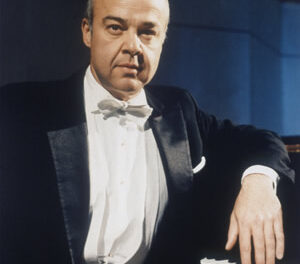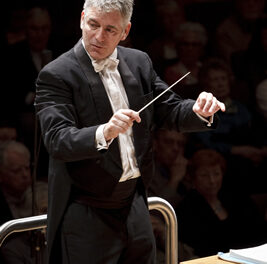Two critically acclaimed Chapel Hill, NC-based theater companies, Wordshed Productions and Ghost & Spice Productions, will present a joint production of Taking Sides, a fact-based courtroom drama by Ronald Harwood (The Pianist and The Dresser), in a split run, Nov. 18-21 and Dec. 2-5 and 9-11 in Swain Hall at the University of North Carolina at Chapel Hill. Taking Sides dramatizes the denazification tribunal of Berlin Philharmonic conductor Wilhelm Furtwängler (1886-1954), who stayed in Nazi Germany and continued to conduct that orchestra during World War II. Furtwängler and his erstwhile rivals Arturo Toscanini and the young Herbert von Karajan, once vied for the title of the preeminent musical conductor of their generation.
“The complexity and intelligence of the play offer questions that are satisfying to explore,” says Matthew Spangler, who will co-direct Taking Sides with Jill Greeson. He adds, “There is ambiguity in the script as to Furtwängler’s guilt or innocence, and there is enough support in the script for either position to be argued even after the play ends.”
Spangler says, “The nature of Furtwängler’s guilt is, perhaps, the most interesting question. In the process of attempting to uncover truth, much is revealed, specifically about the people involved, and more globally about how one can weigh the power of art against the power of art or morality. This complexity makes working with the script challenging and exciting.
“In addition,” Spangler says, “the characters’ relationships are many-layered. The process for both the actors and directors has been intellectually and emotionally stimulating.”
He adds, “Taking Sides imagines the American military’s interrogations of Wilhelm Furtwängler over six months in Berlin in 1946. Furtwängler was the preeminent conductor of his generation. Because he chose to stay in his native Germany during World War II, he was later accused of Nazism, brought under a denazification tribunal in Berlin, and officially cleared of all charges, though he remained under a cloud of suspicion in the American and European press for the rest of his life.”
Spangler says, “Major Steve Arnold (John Murphy) leads the investigations of Furtwängler (Jordan Smith). He is assisted by young Lieutenant David Wills (Allan Maule) and German secretary Emmi Straube (Katja Hill).
“At the opening of the play,” Spangler explains, “Arnold first meets Wills, who has just been sent to assist in the interrogations. Over the course of a week, Arnold has interviewed 28 members of Furtwängler’s orchestra, with Emmi taking dictation. We witness the interrogation of number 29, Helmuth Rode (Rick Lonon), a second violinist who, like all the other musicians, tells wonderful stories attesting to Furtwängler’s strong moral character and his hatred for all things Nazi. Then Tamara Sachs (SaRAH! Kocz), a widow, rushes in to testify for Wilhelm Furtwängler, who she says helped her talented pianist husband escape Germany, though he was later killed in Auschwitz.
“Finally,” Spangler says, “Furtwängler arrives to withstand a first round of questioning. Arnold has little material evidence on Furtwängler and doesn’t make much headway with the conductor, who is arrogant and largely unmovable. He sends him away after some browbeating. As Act I closes, Emmi and David, both music lovers, put on one of Furtwängler’s recordings, intentionally angering Arnold.”
Matt Spangler says, “At the opening of Act II, we find that Arnold has searched the Hinkel Archive, which holds detailed records of all artists who joined the Party under Hitler. In a second interview with Rode, he threatens Rode with knowledge that Rode was indeed a member of the Party but then offers him a plea-bargain: Rode’s freedom for any dirt Rode can offer on Furtwängler’s Nazi ties. Finally, Arnold approaches his second and final interview with Furtwängler with great confidence that he will have enough evidence to indict Furtwängler, but he not only finds this not to be the case, he finds that he must grapple with David’s opposition as well. In the end, Furtwängler is turned out a free but exhausted man with an uncertain future.”
Spangler notes, “This play is quite text heavy, with several long monologues and a host of facts and names and important chronology that are all revealed in the actors’ lines. In addition, four of the six actors speak with German accents. So, the actors have plenty of language issues to grapple with. In addition to that, all of the action of the play takes place in one room, and the script doesn’t call for great variation in action.
“There are, however, great opportunities for exploring subtlety and nuance,” claims Spangler. “This is absolutely a character-driven play. The arcs of the characters — and the relationships that develop — are quite complex. We have worked in detail with pacing and energy, and we have devoted attention to mapping the arcs of individual scenes to reveal the great intensity of emotion that is offered in the script.”
In addition to co-directors Matt Spangler and Jill Greeson, the show’s production team includes set and lighting designer Rob Hamilton, costume designer Diana Waldier and Grier Coleman, and accent coaches Susanne Freytag and Volker Grzimek.
In describing the set, Matt Spangler notes, “The entire play takes place in Major Steve Arnold’s office, which is in a building in the American zone of Berlin. There is a wide doorway upstage center through which actors enter and exit, and one large window. The room is outfitted with sparse furnishings — Arnold’s large desk stage right, David’s small desk at the opposing point stage left, and Emmi’s small desk next to David’s and closer to upstage center. Between Emmi’s and David’s desks is a small table with a phonograph and records and upstage of Arnold’s desk, next to the doorway, is a small woodstove. There are two chairs — one upholstered next to Arnold’s desk and the other hard and straight-backed — both of which get moved to center stage at various points for characters who are subject to Arnold’s interrogations. The room, which may have been used by some German agency in the recent past, is now decorated with American flags and a framed photograph of President Truman.
“Stage right and left of the set, in a figurative exterior to the building in which the main action takes place, is rubble,” Spangler says. “In these two dimly lit corridors, we can see rocks and large pieces of flotsam from the bombing the city endured during the war. We can also see characters from the play in the rubble as they wait there for their turn with Arnold, as they travel to and from the building, and as they simply exist in the cold.”
Matt Spangler notes, “We will use natural lighting.” He adds, “All the actors are costumed authentically for the period. Major Arnold and Lieutenant Wills both wear military uniforms. Emmi is dressed and coiffed with conservative style and taste in outfits appropriate for a secretary. All three regular inhabitants of the office begin the play in a cold office in winter, so they may at various times wear sweaters or coats. Then, as the play skips ahead to spring and then summer, their clothing necessarily becomes lighter.
“Furtwängler wears a coat and tie,” Spangler says, “Helmuth Rode begins in layers of warm clothing, a balaclava, and a hat, as he has been spending time outside, and reappears later in a janitor’s uniform. Tamara Sachs likewise wears layers, as she has also been waiting outside, and she is disheveled, with prematurely gray hair.”
Wordshed Productions and Ghost & Spice Productions present Taking Sides Thursday-Saturday, Nov. 18-20, at 8 p.m.; Sunday, Nov. 21, at 2 p.m.; Thursday-Saturday, Dec. 2-4 and 9-11, at 8 p.m.; and Sunday, Dec. 5, at 2 p.m. in Swain Hall at the University of North Carolina at Chapel Hill. $12 ($5 students and $10 seniors and UNC faculty and staff), except $5 Dec. 2. 919/969-7121 or wordshed@unc.edu. Wordshed Productions: http://www.unc.edu/wordshed. Ghost & Spice Productions: http://www.ghostandspice.com/.












